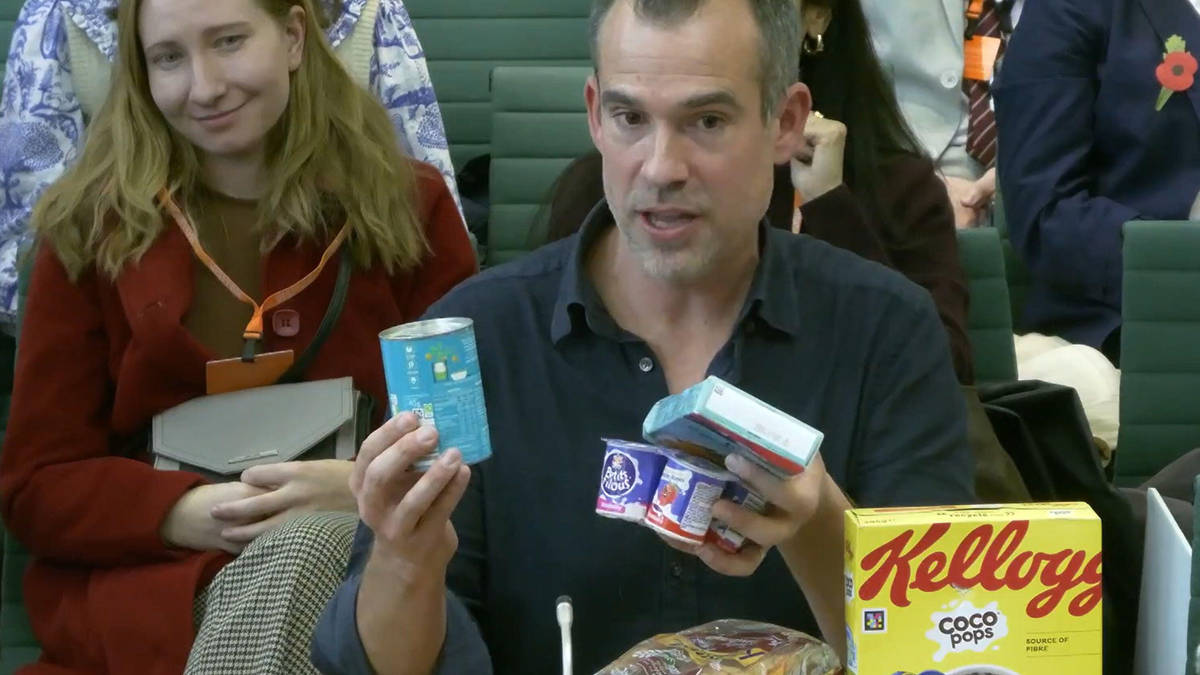Professor van Tulleken blamed “commercial interests” for fuelling this crisis, with people’s health falling by the wayside as a result.
Giving evidence to the Commons health and social care committee, the scientist highlighted how the consumption of “healthy” foods – such as baked beans, fish fingers, wholegrain bread, yoghurt and breakfast cereal – would cause someone to go over the recommended daily level of calories.
He called for these products to be labelled and taxed in a way that shifts people’s shopping habits to a “much healthier diet”.
Surrounded by these products on a table, Professor van Tulleken said: “Everything about the packaging and the marketing and the regulations says this is healthy – there is not one red traffic light on any of these things, and none of these are HFSS (high in fat, salt or sugar), but you will definitely eat too many calories if you eat this kind of food.
“It is engineered so that you cannot eat to appetite, it’s engineered very specifically and cleverly to bypass appetite.
“Even if you stuck to your calories, you would still end up eating massively more salt, sugar and saturated fat than is recommended.”
He added: “How can someone have personal responsibility? This is our national diet. I would say at the moment, there is no functional regulation that captures this.
“I have no idea how someone living with little money and limited educational resources would tell that this was unhealthy. Everything about it says it’s healthy.”
The BBC presenter’s stark warnings came after new figures revealed that one in 10 (10.5 per cent) children in the first Year of primary school in England is obese.
This rises to 22.2 per cent of children in Year 6, according to data from the National Child Measurement Programme.
But Britain has become “numb” to these figures, Professor van Tulleken said.
To help tackle these numbers, he called for cartoon characters to be stripped from packs of popular children’s food and stricter regulations to be placed on unhealthy items.
Food charities and policy officials should also sever ties with the food industry ‘that deliberately market the food that is causing the crisis that we’ve seen grow over the last 30 years’, the professor of global health at University College London added.
“The pandemic of obesity and other diet-related diseases is driven by commercial incentives,” he told MPs.
“The problem of diet-related disease is commercially driven – so big food companies are feeding our kids and our adults ultimately to death, and they know they’re doing it, and they’re engineering foods that they know are harmful, and they’re marketing those foods directly to the most vulnerable kids.
“We have food industry scientists on and off the record who say we deliberately engineer food to be consumed to excess.”
He called for the food industry to be “excluded from the room” when making definitions of “unhealthy foods”.
The professor highlighted how 95 per cent of ultra processed food in the UK are high in salt, fat, sugar or calories.
“We can define unhealthy food, I think using much tighter rules around salt, fat, sugar and calories.
“We don’t need more research to have really strong policy action,” he told MPs.
A spokesman for the Food and Drink Federation, a trade body, said: “Food and drink manufacturers make a wide range of food, from everyday food and drink, like frozen peas, bread and breakfast cereals, to puddings and confectionary.
“Companies have made a series of changes over many years to make the food and drink we all buy every day healthier, in line with independent government guidelines.
“FDF-member products on sale across shops and supermarkets now contain a third less salt and sugar and a quarter fewer calories than they did in 2015.
“For everyone to be confident that food and drink policies and regulations will work in the real world, consultation and collaboration between government and industry is critical.
“Industry engagement with government is transparent and in many cases is governed by formal conflict of interest rules.”

